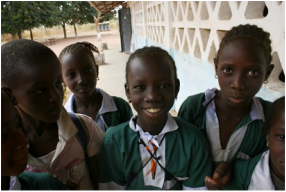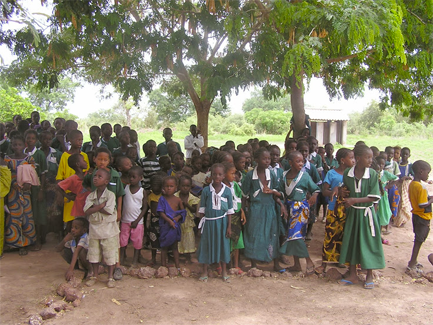Gambia Rising Is Providing Scholarships For Students In The Gambia That Want To Stay In School.
Every dollar helps!

The Gambia is a small country in west Africa, among the world's poorest and with few natural resources except its people. Most are subsistence farmers, although the cities and towns are growing. The country has an extensive public school system, and classes are taught in English (there are five primary native languages spoken in the country). Although the quality of teaching has much room for improvement, education is the key to opportunity.
Unfortunately, school is not free. Although the World Bank is subsidizing school fees in for public schools, students must buy uniforms, buy their own books and supplies, and may also be asked to pay a variety of small fees. Therefore, while their program has made a huge improvement in school enrollment, the very poorest cannot afford school. As children advance, costs increase, until the drop-out level in senior secondary school (grades 10, 11, and 12) has eliminated the majority. A village girl who cannot continue in school after grade 9, may become part of the family’s work force, but the pressure can be great for her to be given in marriage. Nearly all marriages are arranged by parents, and for a man, taking a 15-year old wife to supplement your other wives is seen as a sign of power and prestige. The life of the youngest wife in such a family is rarely attractive.
The cost to pay all expenses for an elementary school child for one year is only $37.50. We are primarily focused on up-country students from villages which are so far from a senior secondary school that they need room and board as well as school expenses, but that totals only $300 per year. After senior secondary school there are a variety of opportunities for those who can afford them: vocational school in the capital ($600 per year), or the university of ($2000).
Unfortunately, school is not free. Although the World Bank is subsidizing school fees in for public schools, students must buy uniforms, buy their own books and supplies, and may also be asked to pay a variety of small fees. Therefore, while their program has made a huge improvement in school enrollment, the very poorest cannot afford school. As children advance, costs increase, until the drop-out level in senior secondary school (grades 10, 11, and 12) has eliminated the majority. A village girl who cannot continue in school after grade 9, may become part of the family’s work force, but the pressure can be great for her to be given in marriage. Nearly all marriages are arranged by parents, and for a man, taking a 15-year old wife to supplement your other wives is seen as a sign of power and prestige. The life of the youngest wife in such a family is rarely attractive.
The cost to pay all expenses for an elementary school child for one year is only $37.50. We are primarily focused on up-country students from villages which are so far from a senior secondary school that they need room and board as well as school expenses, but that totals only $300 per year. After senior secondary school there are a variety of opportunities for those who can afford them: vocational school in the capital ($600 per year), or the university of ($2000).
